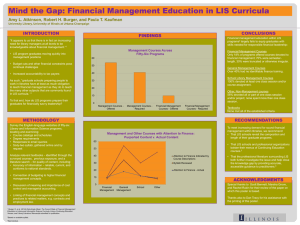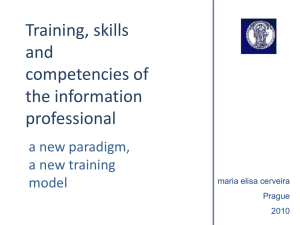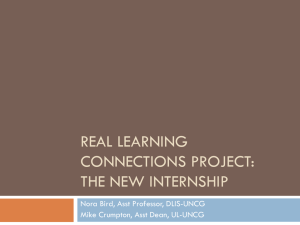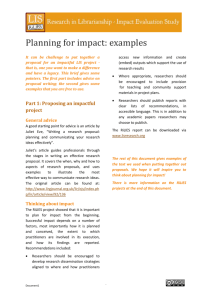Annex 3 Library and Information Services guidelines
advertisement
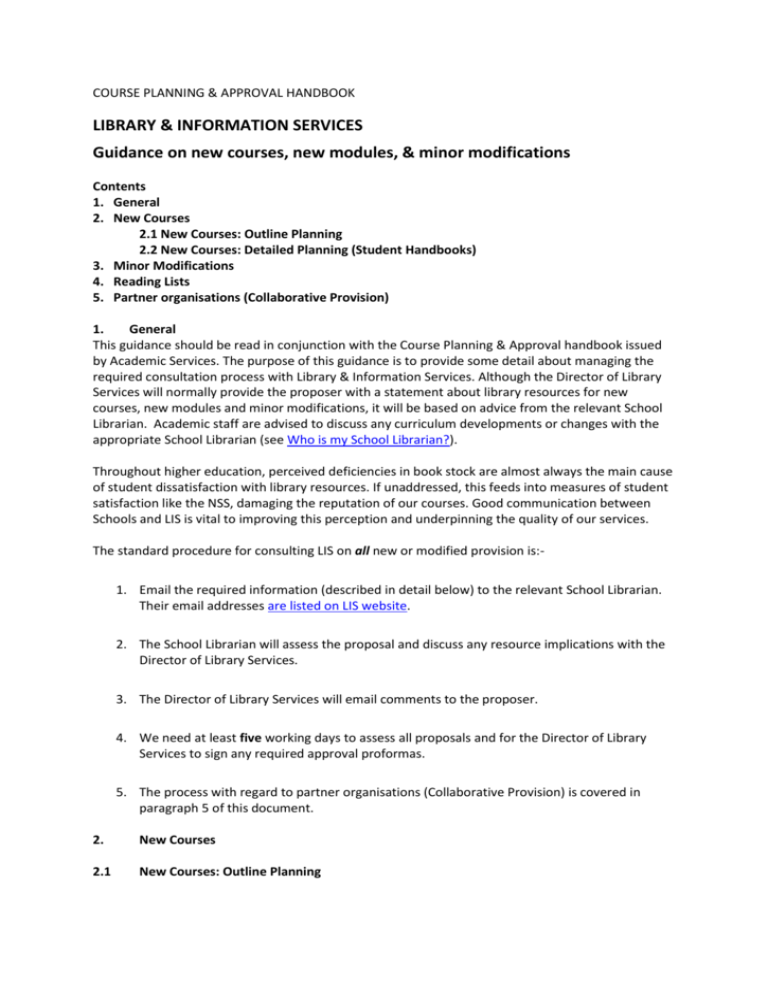
COURSE PLANNING & APPROVAL HANDBOOK LIBRARY & INFORMATION SERVICES Guidance on new courses, new modules, & minor modifications Contents 1. General 2. New Courses 2.1 New Courses: Outline Planning 2.2 New Courses: Detailed Planning (Student Handbooks) 3. Minor Modifications 4. Reading Lists 5. Partner organisations (Collaborative Provision) 1. General This guidance should be read in conjunction with the Course Planning & Approval handbook issued by Academic Services. The purpose of this guidance is to provide some detail about managing the required consultation process with Library & Information Services. Although the Director of Library Services will normally provide the proposer with a statement about library resources for new courses, new modules and minor modifications, it will be based on advice from the relevant School Librarian. Academic staff are advised to discuss any curriculum developments or changes with the appropriate School Librarian (see Who is my School Librarian?). Throughout higher education, perceived deficiencies in book stock are almost always the main cause of student dissatisfaction with library resources. If unaddressed, this feeds into measures of student satisfaction like the NSS, damaging the reputation of our courses. Good communication between Schools and LIS is vital to improving this perception and underpinning the quality of our services. The standard procedure for consulting LIS on all new or modified provision is:1. Email the required information (described in detail below) to the relevant School Librarian. Their email addresses are listed on LIS website. 2. The School Librarian will assess the proposal and discuss any resource implications with the Director of Library Services. 3. The Director of Library Services will email comments to the proposer. 4. We need at least five working days to assess all proposals and for the Director of Library Services to sign any required approval proformas. 5. The process with regard to partner organisations (Collaborative Provision) is covered in paragraph 5 of this document. 2. New Courses 2.1 New Courses: Outline Planning Most new courses have major implications for LIS resources. We will generally seek additional startup costs to buy new stock. Email the following information to the relevant School Librarian: An outline of the new course’s content (no need for reading lists at this stage but provide enough information for the librarians to consider the overall impact and any start-up costs) Estimated student numbers Proposed start-up costs Start date Following discussion, the Director of Library Services will email a statement to the proposer, outlining the LIS view on the planned course. This statement should be included in the Outline Plan along with the date and brief comment on the consultation that took place. Library start-up costs should be indicated in the “Outline Budget” section of the Plan. If the Outline Plan is approved by VCEG prior to 31st March, LIS will bid for any estimated start-up costs as part of our annual budgetary discussion with the Deputy Vice-Chancellor (Finance), normally around Easter. If successful, these funds become available on 1st August. 2.2 New Courses: Detailed Planning (Student Handbooks) The Director of Library Services must approve the draft Handbook of any new or re-approved course before it goes to AQSC. The Handbook should be emailed to the relevant School Librarian, including: Reading lists/key texts & websites for each module descriptor. “Key texts” can be interpreted in the broadest sense, allowing books, e-books, e-journals, trade magazines, DVDs, sheet music, subscription databases, study packs, websites1, etc. Reading lists should follow the bibliographic referencing convention used by your School (Harvard or Numeric). A module descriptor is incomplete without a reading list and LIS will not approve it. Learning resources. The library is often included in this part of the descriptor, although “learning resources” can be defined more widely (for example, in the NSS) as including facilities such as IT resources and specialist equipment. Information skills. The proposer is encouraged to liaise with their School Librarian on the provision of information skills training for students on the new course. Following discussion, the Director of Library Services will complete and return the Approval Proforma to the proposer. After final approval by AQSC and depending on budget availability, LIS will buy sufficient copies of key texts for the student numbers estimated by the Outline Plan. Generally, the lead-in time for getting new stock on the shelves is approximately four weeks. 3. Minor modifications 1 Free websites can be included, but it is advisable not to include the URLs of specific pages (given the short lifespan of web URLs). New or modified modules should not require any additional funding beyond the annual LIS revenue budget, i.e. the bookfund that is allocated by LIS to each School Librarian on the basis of FTE student numbers. If the LIS bookfund is unable to support the purchase of new material, the Dean of School may wish to authorise the transfer of additional funds to LIS. LIS must be consulted before a minor modification is taken to School Board, evidenced with a date on the accompanying Minor Modifications checklist. New module descriptors should first be emailed to your School Librarian, including: Reading lists/key texts & websites for each module descriptor. “Key texts” can be interpreted in the broadest sense, allowing books, e-books, e-journals, trade magazines, DVDs, sheet music, subscription databases, study packs, websites1, etc. Reading lists should follow the bibliographic referencing convention used by your School (Harvard or Numeric). A module descriptor is incomplete without a reading list and LIS will not approve it. Projected student numbers and start date, particularly important for new modules. Learning resources. The library is often included in this part of the descriptor, although “learning resources” can be defined more widely (for example in the NSS) as including facilities such as IT resources and specialist equipment. Following discussion, the Director of Library Services will email comments to the proposer, which will allow the Minor Modifications checklist to be completed. If the modifications are approved by School Board, depending on budget availability, LIS will purchase any key texts not already in stock in sufficient quantities for the projected student numbers. 4. Revised reading lists Changing only a module’s reading list is not classed as a minor modification. However, we strongly recommend that academic staff send all revised reading lists to the School Librarian who will check that LIS stocks the relevant material. Otherwise, student satisfaction may suffer, which will adversely affect module evaluations, the Library Annual Survey and the NSS. 5. Partner organisations (Collaborative Provision) As with BSU provision, it is essential that Subject Leaders for franchised collaborative provision (also referred to as indirectly-funded provision)2 consult with LIS about any proposed new courses or minor modifications before they go to the relevant board or committee. It should be noted that:- 2 Please note that students on validated courses (also referred to as directly-funded provision) do not have access to BSU Libraries or electronic resources. Responsibility for providing learning resources is with the franchised partner organisation. Bath Spa Library & Information Services does not manage partner libraries and receives no funding to provide services on their behalf. We are nonetheless keen to encourage good library provision at franchised partner organisations as part of the University’s commitment to ensuring a high quality student experience. LIS will therefore make an additional check on any proposed new courses or minor modifications at franchised partner organisations. We will forward the proposals to the partner organisation’s Head Librarian (or equivalent), asking them to confirm: Whether they have been consulted about the anticipated learning resource requirements Whether key texts and learning resources can be provided from the partner library’s existing budget allocation Whether key texts and learning resources will be in place, in sufficient quantities, for the start date of the course or module As with BSU modules, a module descriptor is incomplete without a reading list and LIS will not approve it. Based on this information, the Director of Library Services will email comments to the Subject Leader. As the process is more complicated, we need at least seven working days to respond to new courses or minor modifications relating to a partner organisation. School Librarians will be pleased to assist or to answer questions about any aspect of this process. Alison Baud, Director of Library Services, January 2012

